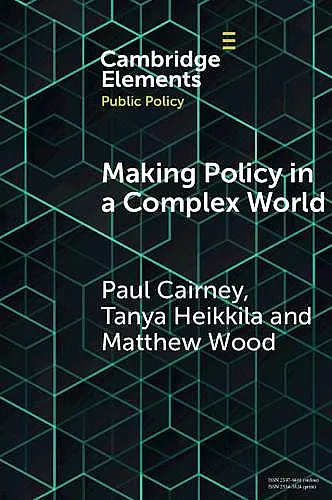Making Policy in a Complex World
Matthew Wood author Paul Cairney author Tanya Heikkila author
Format:Paperback
Publisher:Cambridge University Press
Published:7th Feb '19
Currently unavailable, and unfortunately no date known when it will be back

Focuses on the theories that highlight policymaking complexity and explains complexity in a way that is simple to understand.
Focuses on state-of-the-art theories that highlight policymaking complexity and explains complexity in a way that is simple enough to understand and use. Provides an authoritative guide to multi-centric policymaking for policy scholars which is equally accessible to practitioners, students, and new researchers seeking an introduction to policy theory.This provocative Element is on the 'state of the art' of theories that highlight policymaking complexity. It explains complexity in a way that is simple enough to understand and use. The primary audience is policy scholars seeking a single authoritative guide to studies of 'multi-centric policymaking'. It synthesises this literature to build a research agenda on the following questions: 1. How can we best explain the ways in which many policymaking 'centres' interact to produce policy? 2. How should we research multi-centric policymaking? 3. How can we hold policymakers to account in a multi-centric system? 4. How can people engage effectively to influence policy in a multi-centric system? However, by focusing on simple exposition and limiting jargon, Paul Cairney, Tanya Heikkila, Matthew Wood also speak to a far wider audience of practitioners, students, and new researchers seeking a straightforward introduction to policy theory and its practical lessons.
'I am persuaded that Making Policy is one of the finest introductions to contemporary policy analysis. Cairney, Heikkila and Wood explain very clearly where the study of public policy-making processes is today. By doing that, they demolish several conventional wisdoms that are still predominant in comparative politics and mainstream political science. Among these conventional wisdoms are the stage-oriented imagery of policy processes, the unitary decision-maker, the centrality of elections as mechanism of accountability, and the notion that the chain of delegation correctly describes political realities. By adopting this Element in class, I realized how predominant these wisdoms still are in students with a degree in political science. By showing both theoretically and empirically how public policies are made in the real world, this Element truly opens the minds of the readers and prepares them to go further into the territories mapped by the other volumes, with the necessary background and curiosity.' Claudio M. Radaelli, Journal of Comparative Policy Analysis: Research and Practice
ISBN: 9781108729109
Dimensions: 228mm x 152mm x 6mm
Weight: 240g
84 pages